Trump Scraps Cold War Nuclear Treaty, US Moving To Build New Missiles
Posted on
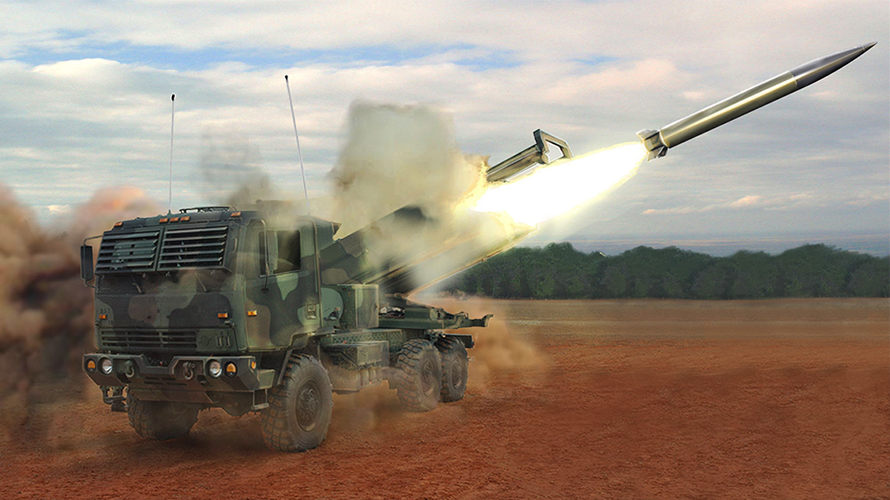
Raytheon’s proposed DeepStrike missile could easily be modified to reach INF-prohibited ranges once the treaty is dissolved.
WASHINGTON: The Trump administration will withdraw from a landmark arms control treaty signed by Reagan and Gorbachev during the waning days of the Cold War, the White House announced today, ushering in what many arms control experts and anxious European allies fear will be a new era of missile proliferation.
“For far too long, Russia has violated the Intermediate-Range Nuclear Forces (INF) Treaty with impunity,” a statement from the White House said. Moscow has refused to admit that it has for years been “covertly developing and fielding a prohibited missile system that poses a direct threat to our allies and troops abroad.”
Despite its name, the treaty prohibits both nuclear and conventionally-armed missiles, but only those launched from land — not air or sea — and only with ranges between 500 and 5,000 kilometers (310 to 3,417 miles). The idea was to ban destabilizing weapons that could threaten either Moscow or NATO capitals from launchers in Europe, while preserving the deterrent value of both sides’ strategic and battlefield weapons. Russia claims its Novator 9M729 cruise missile (NATO codename SSC-8) is a mere tactical weapon with a 490-km range, but both the Obama and Trump administrations have said a modified variant has been flight-tested at “distances well over 500 km.”
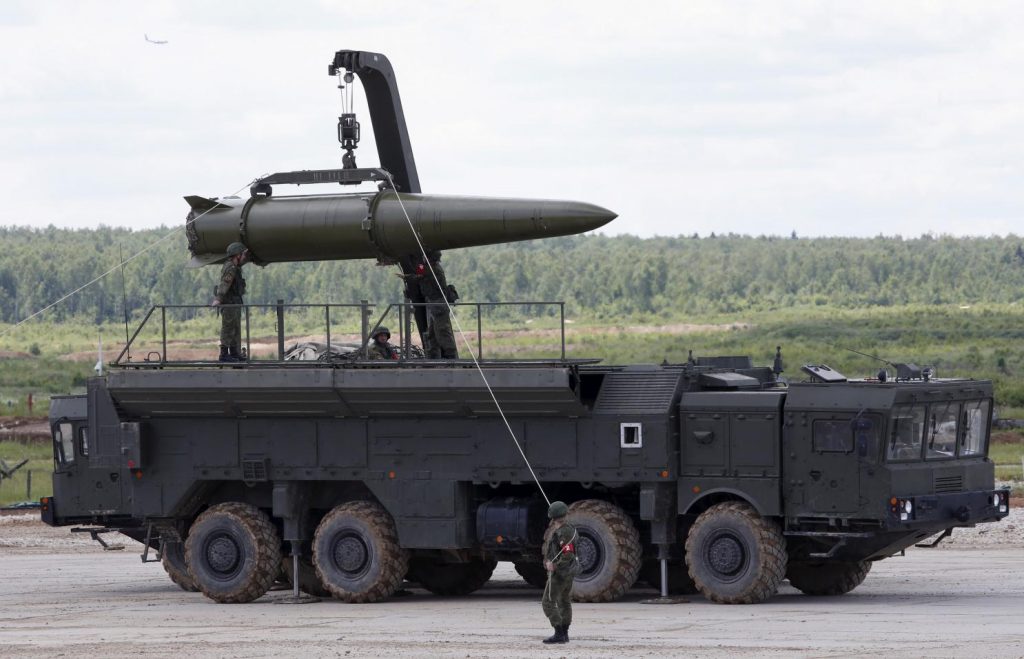
A Russian 9M729 Novator ground-based cruise missile, at least one variant of which violates the INF treaty, according to US intelligence.
Last Chance For Compromise?
The withdrawal, which will formally take place on Saturday, will kick off a six month window during which talks between Moscow and Washington can continue. But neither American nor Russian officials have expressed much hope of saving the deal.
Last minute talks in Beijing this week produced no breakthroughs, the State Department’s Andrea Thompson said after meeting with Russian Deputy Foreign Minister Sergey Ryabkov. “Unfortunately, there is no progress. The US position remains rather tough and ultimatum-like,” Ryabkov said, according to TASS. “We told the US side that it is impossible to hold dialogue in the conditions of attempted blackmailing of Russia,” he said.
A senior administration official told reporters this morning that Russia has already “fielded multiple battalions” of non-compliant missiles. Asked if the Trump administration risks kicking off a new arms race by pulling out of the pact, the official, speaking on the condition of anonymity, said that given the Russian deployments “we reject the assertion that it is the US that is opening the door to an arms race.”
“The United States has fully adhered to the INF Treaty for more than 30 years, but we will not remain constrained by its terms while Russia misrepresents its actions,” the White House said in a statement today. “We cannot be the only country in the world unilaterally bound by this treaty, or any other. We will move forward with developing our own military response options and will work with NATO and our other allies and partners to deny Russia any military advantage from its unlawful conduct.”
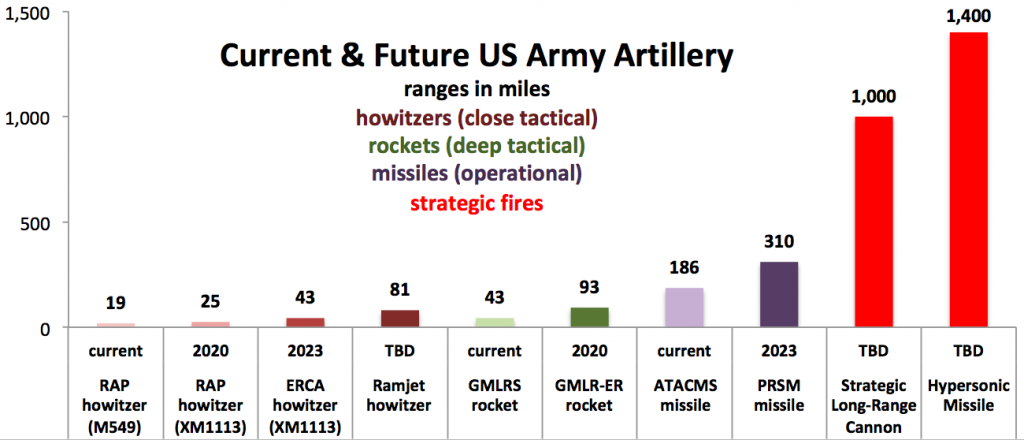
RAP: Rocket Assisted Projectile (current M549A1 or future XM1113). ERCA: Extended Range Cannon Artillery. GMLRS-ER: Guided Multiple-Launch Rocket System – Extended-Range. ATACMS: Army Tactical Missile System. PRSM: Precision Strike Missile.
SOURCE: US Army. SLRC and Hypersonic Missile ranges as reported in Army Times.
Those military responses have yet to to officially announced, but the United States has been laying the groundwork for leaving the treaty for years, as Breaking Defense first reported. A study conducted by the Joint Staff and Strategic Command makes clear that as far back as 2013 — a year before the Obama administration first publicly outed Russian violations of the treaty — the Pentagon was kicking the tires on a variety of weapons the US could quickly develop after the treaty fell apart.
The report points to four ways the US could quickly develop and field missiles within the currently banned ranges, including modifications to existing short range or tactical weapon systems, forward-basing ground-launched cruise missiles, intermediate-range ballistic missiles, or ground-launched intermediate-range missiles with trajectory shaping vehicles.
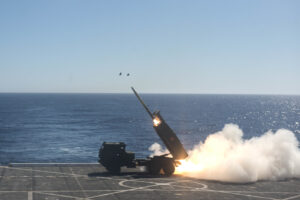
A Marine HIMARS missile launcher fires from the deck of the USS Anchorage.
The US Army has said its future Precision Strike Missile, which enters flight tests this year, could easily be modified for ranges over 500 km. The overarching Long Range Precision Fires initiative, the Army’s top modernization priority, is also planning hypersonic and cannon-launched missiles with ranges over 1,000 miles.
The Marine Corps, too, has been working on a potentially INF-busting weapon, Breaking Defense has learned, dubbed the Navy-Marine Expeditionary Ship Interdiction System (NEMSIS). The rapid development program is being designed to begin firing long-range anti-ship missiles from shore-based ground vehicles at ranges currently banned by the treaty. The Marines are considering Lockheed Martin’s new Long-Range Anti-Ship Missile (LRASM), which a range disclosed only as “over 200 miles,” Raytheon’s Naval Strike Missile and Boeing’s Harpoon.
It is unclear what the upcoming 2020 Pentagon budget will say about these programs, but the administration official said today the US is “some time away from flight test, some time away from acquisition decisions and deployment decisions” about any new missiles.
All the proposed US weapons would be precision-guided conventional explosives: None would be a nuclear weapon.
Allies Are Aboard — Sort Of
The withdrawal announcement comes about two weeks before acting Defense Secretary Patrick Shanahan is due to travel to Europe for his first overseas trip since taking over from James Mattis on Jan. 1. Shanahan will attend an annual meeting of NATO allies in Brussels, followed by a stop in Munich for a defense conference. Vice President Mike Pence will also speak at the Munich Security Summit, where he is expected to take a hard line stance against Russian military adventurism and its INF violations.
NATO allies “fully support” the American withdrawal, a statement by the alliance said.
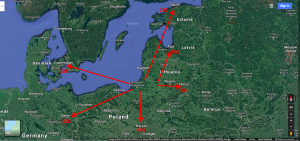
Approximate ranges in miles between the Russian enclave in Kaliningrad and select NATO capitals. SOURCE: Google Maps
“The United States is taking this action in response to the significant risks to Euro-Atlantic security posed by Russia’s covert testing, production, and fielding of 9M729 ground-launched cruise missile systems,” it said. “Allies fully support this action.”
While Europe agrees with Washington on the Russian threat, and its development of the banned missile, leaders on the continent fear a return of Cold War-era missile deployments that threaten its capitals.
German Chancellor Angela Merkel said Friday her government “will make every possible effort to use the six-month period to hold further talks. It is clear to us that Russia has violated the treaty. There needs to be dialogue. On our part, the German foreign minister and I will do everything to pave the way for talks within the six-month period,” Merkel added.
Carnegie Endowment for International Peace experts Pranay Vaddi, George Perkovich, and James Acton wrote Thursday that the US withdrawal “without a strategy supported by allies to contest Russian coercion and restore stability in Europe poses severe political and military problems for the United States and its European allies.”

Approximate ranges in miles from Chinese territory to select US and allied targets. SOURCE: Google Maps
But Europe isn’t the only region affected. China, which is not a partner to the treaty, already fields missiles within the range prohibited by the treaty, a fact US officials say puts America at a disadvantage in the region.
“It is a reality that China is uncontained,” the administration official said. “It is a reality that they have over 1,000 of these missiles. But for the United States this isn’t about China.”
The three analysts fear that U.S. withdrawal “will exacerbate missile proliferation in Asia without improving U.S. security in the Pacific. U.S. standing with its Asian regional allies—including Japan, South Korea, Australia, Taiwan, and India—could be further reduced without a comprehensive regional security strategy that those allies support.”
The knock-on effects of the withdrawal are unclear. But many look to the upcoming negotiations between the US and Russia on an extension of the New START treaty as being a potential casualty. Russian Deputy Foreign Minister Ryabkov told a Russian TV channel Friday, “what will come next is a huge question. I fear that the New START may share the fate of the INF Treaty, it may just expire on February 5, 2021, without an extension.”
American officials have said the two pacts aren’t tied in any real way, and they see no reason talks on New START can’t be successful.
Sydney Freedberg also contributed to this story.
The full text of President Trump’s statement follows:
Office of the Press Secretary
FOR IMMEDIATE RELEASE
February 1, 2019 Statement from the President Regarding the Intermediate-Range Nuclear Forces (INF) TreatyFor far too long, Russia has violated the Intermediate-Range Nuclear Forces (INF) Treaty with impunity, covertly developing and fielding a prohibited missile system that poses a direct threat to our allies and troops abroad. Tomorrow, the United States will suspend its obligations under the INF Treaty and begin the process of withdrawing from the INF Treaty, which will be completed in 6 months unless Russia comes back into compliance by destroying all of its violating missiles, launchers, and associated equipment. Our NATO Allies fully support us, because they understand the threat posed by Russia’s violation and the risks to arms control posed by ignoring treaty violations.
The United States has fully adhered to the INF Treaty for more than 30 years, but we will not remain constrained by its terms while Russia misrepresents its actions. We cannot be the only country in the world unilaterally bound by this treaty, or any other. We will move forward with developing our own military response options and will work with NATO and our other allies and partners to deny Russia any military advantage from its unlawful conduct.
My Administration remains committed to effective arms control that advances United States, allied, and partner security, is verifiable and enforceable, and includes partners that fulfill their obligations. For arms control to effectively contribute to national security, all parties must faithfully implement their obligations. We stand ready to engage with Russia on arms control negotiations that meet these criteria, and, importantly, once that is done, develop, perhaps for the first time ever, an outstanding relationship on economic, trade, political, and military levels. This would be a fantastic thing for Russia and the United States, and would also be great for the world.
###
Subscribe to our newsletter
Promotions, new products and sales. Directly to your inbox.

